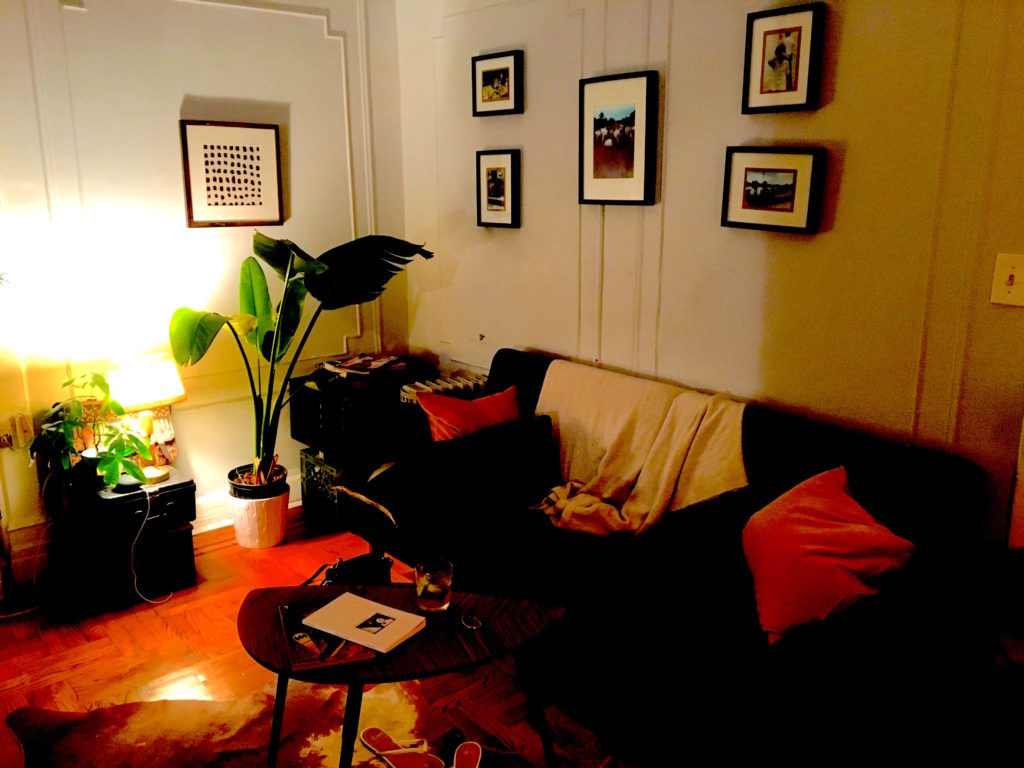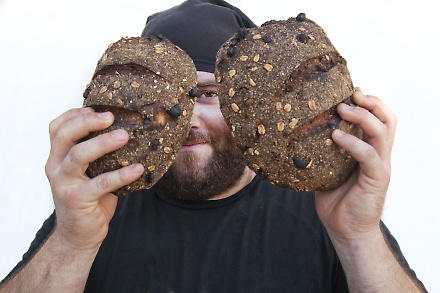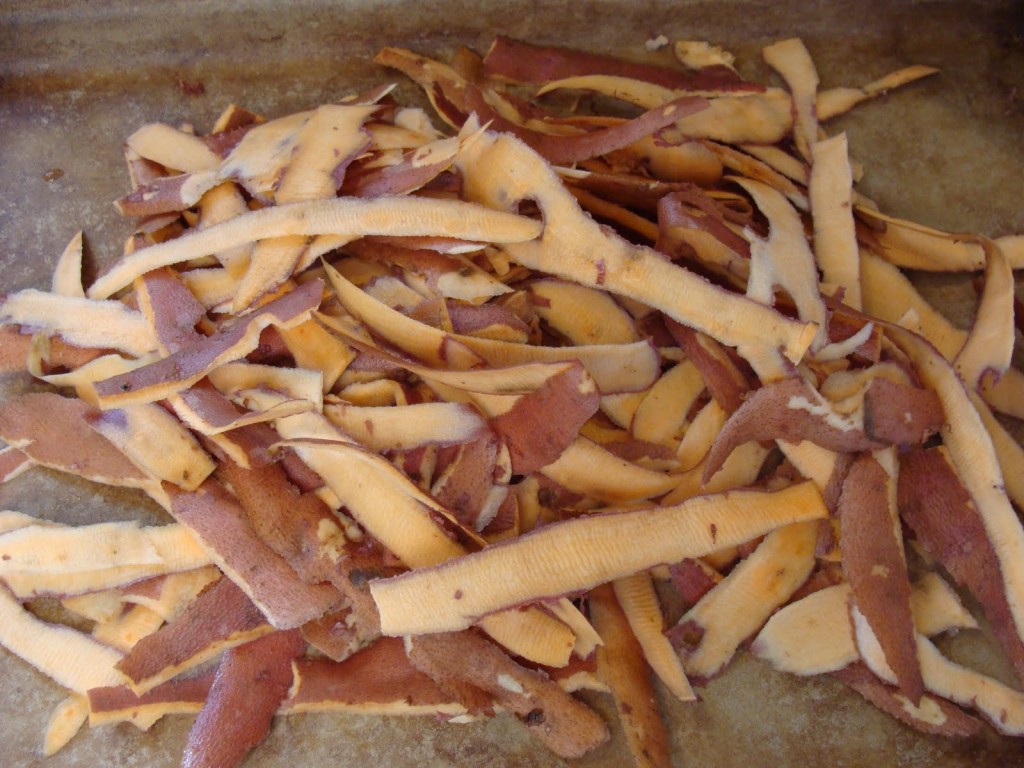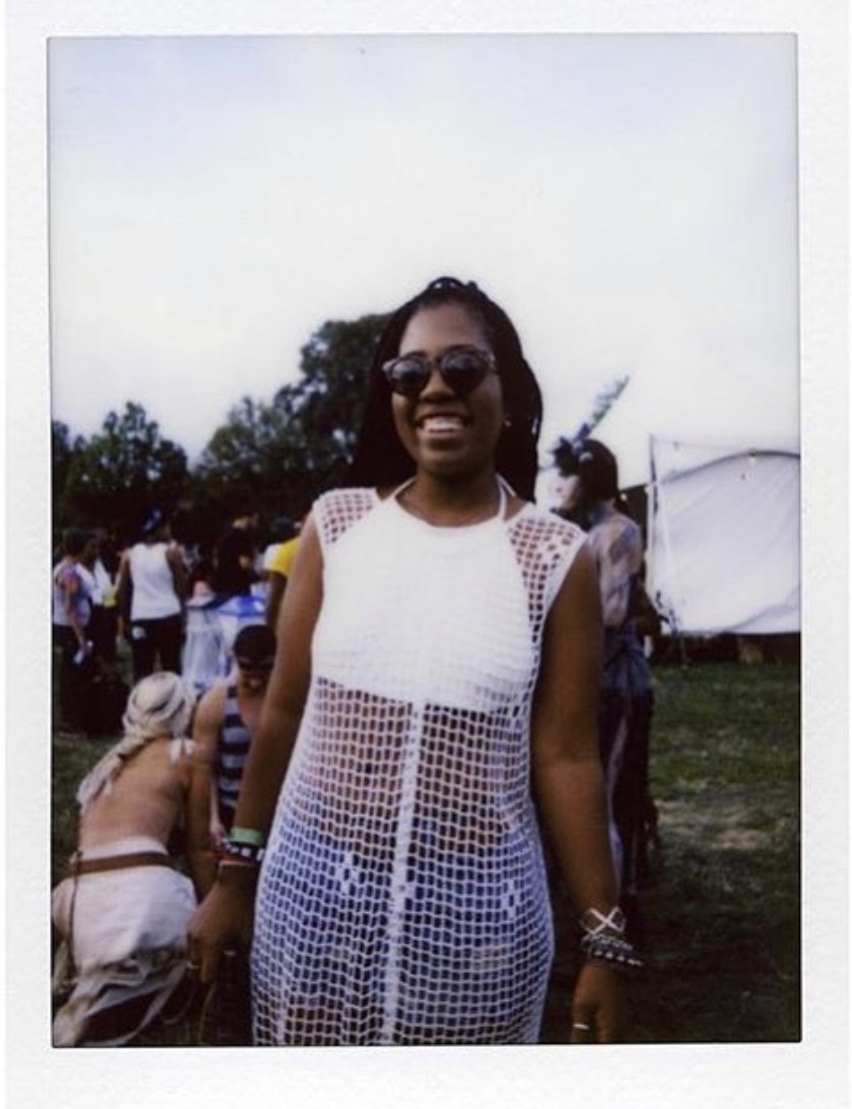
Glynn Pogue is a powerhouse. A fellow New School MFA alum (2017), with several pieces published in reputable magazines, and named Brooklyn Magazine’s 2018 “30 Under 30,” Glynn is ambitious, eloquent, and a total bad-ass. I was lucky not only to sit down and talk over a meal with her, but in her home where she made me a delicious vegetarian dinner of tacos, beans and rice. We got to talking about her childhood in Bed-Stuy and discovered that both of us grew up with ambitious mothers who traveled a lot for work. Sated with homemade cocktails in hand, we got started with the interview.
Felicity: What’s your writing routine if you have one?
Glynn: I think I write in bursts. This is kind of a whack analogy, but it’s like a faucet. So if I start to think about something, it just continues. The faucet opens, and it continues to run and run and run all day. I might wake up in the morning with an idea, and I’ll start to jot something down as I’m walking to the train station. Then, while I’m on the train, or at work, the story is writing itself in my head, and I’m constantly taking notes. So then, by the time I sit at my desk, it’s already there.
Felicity: I’ve recently started writing in my Notes app and it’s really helpful.
Glynn: I write in my Notes. I send myself emails constantly of exact lines that I want to use, or stories I want to write so that I don’t forget, and then it’s about finding the time. But I sort of see it before it happens.
Felicity: Do you snack on anything when you’re reading or writing?
Glynn: I love gummy bears so much. Little snacks like that, that you can just constantly grab. If I get into a full meal, then there’s no writing happening probably. Maybe some takeout sushi, which is like my favorite thing to order. But usually, whiskey or red wine, if I’m honest about things.
Felicity: I haven’t heard sushi for writing before. That sounds good because it’s something you can kind of pick on.
Glynn: It can’t be something that I’m really digging into and enjoying, it has to be something kind of like mindless, where you’re biting and continuing to move. I also don’t even know how often I actually eat while I’m writing. It depends. If I’m writing a piece that’s kind of kicking my ass, and that’s usually something that I’m writing for an assignment or something, it’s just coffee and wine. If it’s a piece I’m really digging into for passion, then maybe I’m writing and then maybe I’m taking a break to go cook, which is a thing that really fills me. I love cooking. It’s a whole creative process in itself.
Felicity: What’s your favorite broke artist meal?
Glynn: Oh my god, I love this question. Literally, what we just had. I can buy five cans of beans from the grocery store for $5. So I get a black beans, a red beans, a chickpeas, a black-eyed peas, and pink beans. And I plan my whole meal around that bean, that protein, and some kale, and a boiled egg, and some tomato. I just cut up some tomatoes and put them on top. That’s my favorite.
Felicity: That’s so healthy!
Glynn: But it’s like the cheapest thing too, because it’s just all vegetables and canned goods and shit. And my favorite broke meal eating out: I love a good dollar slice, the dollar slice spot even right by The New School, right by the A train.
Felicity: What food do you think is the most fun to write about?
Glynn: Okay. I’m going to give two answers. I was actually recently working on a piece for a travel publication about the Civil Rights Trail in Alabama. It was an interesting piece to write because I was going to the south as a person with southern roots who doesn’t know a lot about her southern heritage. My grandparents were all from Virginia and South Carolina, but they lived in New Jersey and DC. The only thing I actually knew about my southern heritage was the food, that’s the only thing that had trickled its way into my history or my memories. The food was so present; the greens that have been simmering on the stove all day, and yams, and mac and cheese and, like, soul food. So I love writing about that cuisine because it’s so steeped in tradition and there’s so many memories there. And when I think about it, it reminds me of my grandparents who’ve all since passed. There’s so many stories there. As soon as I think about that food, it reminds me of being in the kitchen with my grandmother. Now I’m thinking about her and her stories and how she looked. They’re so much tied to that food. And then, in general, I like writing about food while traveling. I like the process of discovering a dish and the history of that dish. I love a food that’s steeped in tradition, that people have been making forever, that has sort of transformed as it’s been passed from hand to hand to hand to hand.
Felicity: Do have an example of a food that you discovered?
Glynn: When I was living in Cambodia, my favorite thing to eat every morning was called bor bor, which is just basically a rice porridge, like a congee. Which is crazy because I’m a vegetarian, pseudo-vegan. But they made this broth out of all sorts of bones and bits of pigs and cows and chickens—everything. And then, like, rice is in it. And they’re stewing this out all day and they’ll put some lemongrass in it and some scallions and all kinds of spices, I still haven’t determined what they were. So it’s a beautiful base of this rich, ricey broth. This is a beautiful soup basically. And then they’ll add fish to it. And then they’ll add beans sprouts. I’d always load in a ton of chili and fresh lime. And I would have it every morning. And that was really interesting to me because from my understanding it is a result of the Khmer Rouge when there was literally no food because the country was going through genocide. And it’s a country that produces a lot of rice, so rice is always the base to all meals there. I’m always interested in traditions or practices that come out of necessity that have been turned into something that people have made beautiful.
Felicity: Some of the best dishes are made that way.
Glynn: It’s interesting to think about a meal like that porridge and just talking about soul food, as well, which was also like, “We don’t have anything. These are the things that we have to make, and we’re going to pour our love into them.” Oh my god, I just connected these dots. I like food born out of “struggle” or “hardship” or something that has been repurposed and filled with love, and that has stories and tradition.
Felicity: It’s kind of like art made from hardship—that also tends to be really beautiful. What is your favorite piece of writing/art that has to do with food?
Glynn: The first thing that comes to mind is Cigarettes and Coffee. It’s this film where all these different scenes are intersecting with each other. It’s a lot of short vignettes, all these conversations that take place over cigarettes and coffee, in a diner in all these places. It’s just dope. And I think I like it partially because I create fantasies of a writer’s life, and a lot of that is always linked to black coffee and cigarettes and, like, a black turtleneck. This is my artist identity. So, I think the Cigarettes and Coffee thing kind of tells some sort of story about that lifestyle. Also, these people are in a diner and all they can get is the coffee that is, like, bottomless.
Felicity: Unlimited refills!
Glynn: I love films that are discourse-based. I think of that movie, My Dinner With Andre. It’s just a conversation. Or those films Before Sunrise, Before Sunset, they’re like movies of dialogue, which is interesting when you think about any kind of art made about a meal, because…
Felicity: It has to be around discourse.
Glynn: It has to, right? If it takes place where people are sitting down and they’re sharing a meal, then there’s conversation and that’s it. Unless something crazy inserts itself. But now that I think about it, if you choose to make a piece of art around a meal, then you want to highlight the characters that are at the table and what’s being discussed there, which makes me think about that Master of None episode, “Thanksgiving.”
Felicity: That is such a good episode.
Glynn: Really beautiful. That’s also another great one. And similar to what I was talking about earlier with the soul food. So much of the episode is all the preparations to make these dishes that they’re going to have there. And a lot of what they made is really familiar to me.
Felicity: What’s your ideal meal, finances put aside? Like, the opposite of a broke artist meal.
Glynn: I think of that guy, Jiro, the sushi guy. I’m obsessed with sushi. I really fucking love sushi so much. It’s probably one of my favorite foods. And Jiro supposedly makes the best sushi of all time. There’s a film called Jiro Dreams of Sushi. Really beautiful. If you ever watch Chef’s Table, where they make food look really poetic and there are these slow shots of people cutting things and the music is really dramatic and beautiful—Jiro Dreams of Sushi is similar to that. So this guy Jiro, in Japan, it’s impossible to get a table at his restaurant. Two of my friends, when I was in Cambodia, flew to Japan just for the day to go to eat there. And it’s like the kind of thing where he’s constantly putting plates, putting plates, putting plates. He’s just there all day. You have no choice over what he’s going to give you. You just take it. I would love that. I’m bougie as fuck, even though I’m very, very poor. I’m just really trying to get to a point where money is never a problem. I want bougie-ass dinners all the time. Chef’s choice. Sitting at the chef’s table, and every dish has a wine pairing. So like Jiro, but, like, any place where I can have that kind of thing where every little bit of it is thought about.
Felicity: That sounds amazing. I want to experience that.
Glynn: In Cambodia, it’s really strange, they have a really good food scene there, and I ate at a Michelin star restaurant for, like, nothing. And it was like a six-course dinner where there was foam and random shit—you know when there’s foam, we’re doing things now.
Felicity: Yeah, things are not usually in foam form. Okay, if you had to live off of one food for the rest of your life, what would it be?
Glynn: I think I want to eat pasta—but then I would have problems staying snatched! I think, ultimately, pasta is my favorite thing. Damn everything’s connecting even more, talking about soul food and the congee dish. I like comfort food. I like things I can eat in a bowl, like cheese and saucy stuff and savory things. So yeah, pasta. Like a really, really good spaghetti.
Felicity: What is your favorite book and what food would you associate with that book?
Glynn: I think I’m going to say The Brief Wondrous Life of Oscar Wao. Junot Díaz is my favorite writer. He’s Dominican, so just literally Dominican food. When I was in high school, there was this Dominican restaurant that me and my friends loved to go to. We ate a lot of mofongo and tostones and all that kind of stuff. It just reminds me of Dominican food, in general. Mashed plantain and dark meat. All of the seafood and the good rice and a good ass bean and some fucking plantains. Perfect.
Felicity: That sounds really good—definitely, want to try that now. What do you think is the most writerly food/drink?
Glynn: Seriously, coffee, red wine, and whiskey.
Felicity: Ok. All liquids.
Glynn: Yeah! And cheese and, like, grapes, and crackers and figs. I could eat all those things at The New School’s readings and every other literary thing ever. For a while, I was just like, “I’m hanging out with the wine and cheese set,” which is the literary group.
Felicity: The snacks, the bougie snacks.
Glynn: Yeah, the bougie snacks. But also on a pseudo-budget because I buy Cracker Barrel and saltines from the corner store then eat it with cheap wine.
Felicity: But it’s delicious.
Glynn: And it fills you up and it looks fancy.
Felicity: That’s like a metaphor for being a writer: looks really fancy but is actually broke.
Glynn: That’s what I think that the cheese and wine thing is about.
Felicity: Bougie with no basis.
Since we were in Glynn’s apartment, I decided to do food associations using the books on her bookshelf. Glynn went through different books she had and discussed which foods she associated with them.
Negroland by Margo Jefferson – Immediate association is fucking cucumber sandwiches with the crusts cut off. Like a high tea, like you’re at cotillion and you’re trying to learn how to cross your legs.
Random Family by Adrian Nicole LeBlanc – Random Family is really one of my most favorite fucking books of all time. It’s written by a journalist, so it’s reported, but it’s this layered story about these people who live in the Bronx, who live uptown. It’s super New York. So let’s go with Italian ices, New York City summer stuff you’re eating when you’re out on the block, at the block party kind of thing.
Meeting Faith by Faith Adiele – This book is written by one of my mentors. She was one of the first black monks in Thailand. So let’s just say a pad thai, which is also one of my favorite things. I think Thai food is another amazing broke writers’ meal to feel bougie, too, because Thai restaurants always will have some fly-ass décor inside and it’s like super dark and moody and shit. But your meal is like $20. It’s like a good cheap date.
The Land of Love and Drowning by Tiphanie Yanique – I would say it makes me think of roti and escovitch fish, like Caribbean food, West Indian food. Which is another big part of my food love, being from New York and being of a diasporic black New York experience where a lot of my friends are West Indian and black American. So I was introduced to a lot of this kind of food and culture. I actually really, really, really love stories about the Caribbean. Love it.
Here Comes this Sun by Nicole Dennis-Benn – That’s a beautiful book. It’s set in Jamaica and makes me think of like jerk chicken and oxtails and all that stuff.
Nancy Drew: The Secret of Shadow Ranch by Carolyn Keene – I read all of these as a kid. I read them every summer with my parents when we’d go to the Jersey Shore, where we have a bed and breakfast. So it makes me think of saltwater taffy, and steamed shrimp or, like, fresh seafood off the wharf.
All Tomorrow’s Parties by Robb Spillman – I actually interviewed him when I was at The New School, and it’s about his times in Berlin just being an artist and being Bohemian and all that shit. I was in Berlin a month ago, two months ago. So my food memories are still semi-fresh. The thing that was dope about Berlin was I didn’t eat anything that felt distinctly German. It actually felt fairly international. So I had amazing falafel but it was Sudanese falafel, I’m pretty sure, Sudanese or Somali. It had a spicy peanut sauce, and you could add halloumi to it and tofu along with the falafel. It was a really interesting falafel that I’ve had only in Berlin.
 Glynn Pogue is a 26-year-old writer from Bed Stuy, Brooklyn. BedStuyBrat was her AOL Instant Messenger name back in the T-Mobile Sidekick days, and the moniker still applies, as much of Glynn’s works centers around her community of brown people and brownstones. Named one of Brooklyn Magazine’s 30 under 30, the do-or-die dreamer’s writing has been featured in Vogue, Guernica, Essence, and National Geographic Traveler, among others. A graduate of The New School’s MFA in Creative Writing program, Glynn is currently crafting a collection of essays on race, class, identity and her beloved Bed-Stuy. Find more of her work at glynnpogue.com.
Glynn Pogue is a 26-year-old writer from Bed Stuy, Brooklyn. BedStuyBrat was her AOL Instant Messenger name back in the T-Mobile Sidekick days, and the moniker still applies, as much of Glynn’s works centers around her community of brown people and brownstones. Named one of Brooklyn Magazine’s 30 under 30, the do-or-die dreamer’s writing has been featured in Vogue, Guernica, Essence, and National Geographic Traveler, among others. A graduate of The New School’s MFA in Creative Writing program, Glynn is currently crafting a collection of essays on race, class, identity and her beloved Bed-Stuy. Find more of her work at glynnpogue.com.
Headshot by John Midgley.
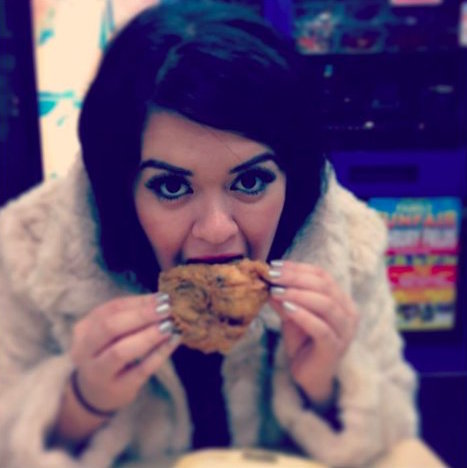 Felicity is a recent graduate of The New School Creative Writing MFA program, her work has been published in Brooklyn Magazine, The Inquisitive Eater, and Enchantress Magazine. Her writing can also be seen with Barbershop Books and Healthy Materials Lab. Currently the Digital Publishing Assistant at The University of Chicago Press, Felicity enjoys writing in all its forms. You can find her on Twitter @charmingfelic
Felicity is a recent graduate of The New School Creative Writing MFA program, her work has been published in Brooklyn Magazine, The Inquisitive Eater, and Enchantress Magazine. Her writing can also be seen with Barbershop Books and Healthy Materials Lab. Currently the Digital Publishing Assistant at The University of Chicago Press, Felicity enjoys writing in all its forms. You can find her on Twitter @charmingfelic

